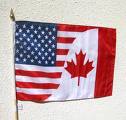Canadian Military Units To Undertake “Domestic Security”
The militarization of law enforcement in the U.S., Canada & Britain is accelerating at a rapid pace

The Canadian military is reorganizing its priorities to suit a “post 9/11-world,” by creating reservist units for each area of the country that would be tasked with providing “domestic security,” and involve roles such as the mass internment of citizens in the event of a terrorist attack.
“The Canadian military has embarked on a wide-ranging plan to turn its reserve soldiers into focused units trained and equipped to respond to a nightmarish array of domestic threats,” reports the National Post.
“The remodeling of the reserves will see the development of specialist units in four of the military’s regional divisions — Atlantic, Quebec, Ontario and the West.”
This is an open announcement that Canada has been subdivided into military units that will be policed by military reserves, who will take a “dominant role in domestic operations in the future,” according to the article.
Of course, the necessity of the change is dressed up using the notion of troops helping people in the event of earthquakes, floods and nuclear accidents, but we also learn that one of the duties that the reservists would potentially undertake would be mass internment of citizens in camps or quarantine zones after a biological terror attack.
“We are training to establish a perimeter,” said Brigadier-General Jean Collin. “Do I see a scenario when we might be obliged to keep people in? Probably. You need to be trained to be able to make sure that you don’t become a casualty in the process of doing that security.”
In light of that comment, it’s interesting to note that, according to the report, Brig-Gen. Collin, who has served in Bosnia and Afghanistan, “has also been a special advisor to the Chief of the Defence Staff on homeland security issues.”
Other roles for the military reservists would be to undertake law enforcement and other “security” duties for domestic events such as the 2010 Winter Olympic Games in Vancouver and the 2010 G8 summit of world leaders in Huntsville.
The story dovetails with a report out of Barrie, Ontario, where authorities are considering using troops from the local army base to patrol bar areas on weekends in a supposed attempt to prevent rowdiness.
Mention is also made of “scenarios that might require a form of constabulary or policing function for reserves in civilian containment and security.”
David Bercuson, director of the Center for Military and Strategic Studies at the University of Calgary, attempted to dismiss the premise by claiming reservists would oppose such measures.
“People in Ottawa sometimes forget that the reserves are volunteers. If you try to change the reserves in ways they don’t want to change, they just might not show up,” he said.
Would reservists oppose the use of military units for purposes of domestic law enforcement and not show up, or would they just follow orders under the justification of a breakdown in authority after a biological attack or mass rioting after a total economic collapse?
I’m not so confident that people who have been kicking down doors, abducting, torturing and killing people in Afghanistan for seven years under the justification that they are terrorists would be unwilling to do the same to Canadian citizens if they were drilled with the same propaganda.
The militarization of law enforcement duties in the U.S., Canada and Britain is accelerating at a pace never before seen.
Last week it was revealed that the British Army is on standby to deal with rioting on UK streets as a result of the economic crisis, according to a newspaper report, which states that MI5 is targeting political activists who could help create a “summer of discontent”.
Meanwhile, in the U.S., urban warfare training drills are taking place across the country as Northcom announces that tens of thousands of active duty troops will be stationed inside the U.S. for domestic purposes.
The U.S. Army War College in November released a white paper called Known Unknowns: Unconventional ‘Strategic Shocks’ in Defense Strategy Development. The report warned that the military must be prepared for a “violent, strategic dislocation inside the United States,” which could be provoked by “unforeseen economic collapse,” “purposeful domestic resistance,” “pervasive public health emergencies” or “loss of functioning political and legal order.” The “widespread civil violence,” the document said, “would force the defense establishment to reorient priorities in extremis to defend basic domestic order and human security.”

